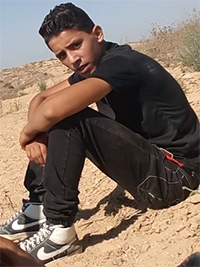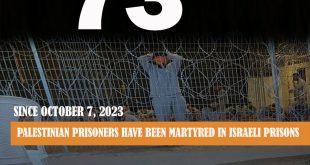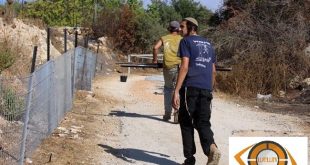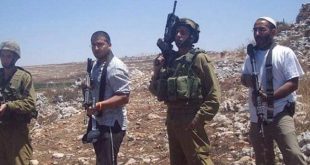Soldier kills Palestinian teen who posed no threat by firing flare bomb at him across Israel-Gaza fence
On 9 September 2016, at 7:10 PM, a soldier fired a flare bomb from very short range at 15-year-old Palestinian ‘Abd a-Rahman a-Dabagh during a protest held near the Gaza perimeter fence, east of al-Bureij Refugee Camp. A-Dabagh, a resident of the camp, was killed. The flare bomb hit a-Dabagh above the eye, fractured his skull and remained lodged it in. It stuck to his face and kept burning for a while. Video footage filmed by another protestor and obtained by B’Tselem captured the moments just after the flare was fired, and shows a-Dabagh lying on the ground, with the burning flare up against his face. In a media statement, the military said the troops who were at the scene were not responsible for the incident.
B’Tselem’s investigation found that, as occurs every Friday afternoon, some one hundred youths and children staged a protest near the Gaza perimeter fence east of al-Bureij RC. On the other side of the fence, within Israeli territory, there were about four military jeeps and at least ten soldiers, some of them standing by the jeeps and some on dirt mounds behind the jeeps, toward east. Some of the protestors threw stones at the soldiers. A-Dabagh was among them, using a sling shot. According to eyewitnesses, the soldiers fired live shots in the air and at the protestors’ legs, and also launched tear gas canisters, stun grenades and flare bombs at them.
At around 3:00 PM, a-Dabagh approached the barbed wire fence located about ten meters west of the perimeter fence, together with some ten other protestors. They cut the barbed wire, crossed it, and approached the perimeter fence. The youths got up to a distance several meters away from the soldiers and then went back and forth several times. According to the protestors, the soldiers shot tear gas canisters and flares at them.
The stone-throwing and the shooting at the protestors continued until evening. Shortly after 7:00 PM, after a-Dabagh had retreated 10 to 15 meters away from the fence, one of the soldiers shot a 40-mm flare bomb directly at him, using a launcher. A.D., 31, from Deir al-Balah RC, described what he saw to B’Tselem field researcher Khaled al-‘Azayzeh:
The soldiers fired two flare bombs directly at us. The bombs hit the fence and started a fire. Shortly after 7:00 PM, a soldier took a few steps and came up to the fence, put the barrel of his rifle through it and fired a flare bomb straight at ‘Abd a-Rahman. The bomb hit his head. He immediately fell to the ground and his face kept on burning.
I came up to him quickly, but one of the soldiers told me in Arabic: “Get back or I’ll shoot you”. I told him I just wanted to lift him up. I took two steps toward ‘Abd a-Rahman, and the soldier shot a few bullets at my legs. I stopped. Then, the soldier turned on his gun’s laser sight and put it on me. Once the fire on ‘Abd a-Rahman’s face went out, the soldiers let us go to him. His face was burnt and he was bleeding. He was unconscious and didn’t move. I yelled, asking for help from the guys, and they came and lifted him up.
H.H., 25, a resident of al-Bureij RC who was at the demonstration, told B’Tselem field researcher Khaled al-‘Azayzeh:
‘Abd a-Rahman raised his hands above his head, making a V sign, and took a few steps back. Then, one of the soldiers came forward and shot at him, and ‘Abd a-Rahman retreated. I heard the sound of the grenade that had been shot at us exploding. I saw ‘Abd a-Rahman, who had fallen to the ground, with his face on fire. I tried to get close to him to give him first aid, but one of the soldiers told me to stay back. He pointed his gun at me and fired a bullet next to me. I stayed standing there, yelling to the guys to come help me take care of him. He stayed lying on the ground until the fire on his face went out. I asked the soldiers, with my hands up, to let me and another guy to go over. We walked a few meters until we got to him.
After the fire went out, the soldiers allowed protestors to walk over to a-Dabagh, and a few of them went up to him and carried him to a Red Crescent ambulance parked about 300 meters away from the perimeter fence. From there, a-Dabagh was taken to Shuhada al-Aqsa hospital in Deir al-Balah.
The post-mortem examination carried out at the hospital revealed a-Dabagh had been hit on the left side of the head, above the left eye. The flare bomb caused a fracture in the left side of the skull, a fissure and hemorrhaging on the left side of the brain and external burns in the area of the injury. A-Dabagh’s death certificate specifically noted that the injury that caused his death resulted from a flare bomb hitting his head.
B’Tselem’s investigation found that the soldier fired the flare at a-Dabagh at a time when he posed no threat to the soldiers, who were standing on the other side of the perimeter fence, well protected. This is the 20th casualty in Gaza since demonstrations near the perimeter fence began in October 2015.
Flares are not a crowd control measure. Their function is to illuminate dark areas or send a message to other units. They may only be fired in the air aimed high, so they can illuminate the area. They certainly may not be fired directly at protestors.
In the past, B’Tselem would have contacted the authorities in such a case and demanded an investigation and measures against those responsible for a-Dabagh’s death. However, several months ago B’Tselem announced it would no longer refer complaints to the military law enforcement system, which functions mainly as a whitewash mechanism, rather than as a means of uncovering the truth or seeing justice done. Our decision naturally has no bearing on the authorities’ duty to carry out their task and investigate everyone responsible for this incident. However, even if an investigation does take place, experience shows the chances of it leading to any substantive results are extremely low.

 العربية
العربية עברית
עברית Türkiye
Türkiye Русский
Русский Français
Français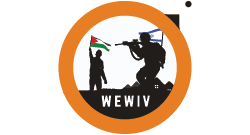 We Watch Israeli Violations Specialized website in monitoring and documenting Israeli violations against Palestinians
We Watch Israeli Violations Specialized website in monitoring and documenting Israeli violations against Palestinians

